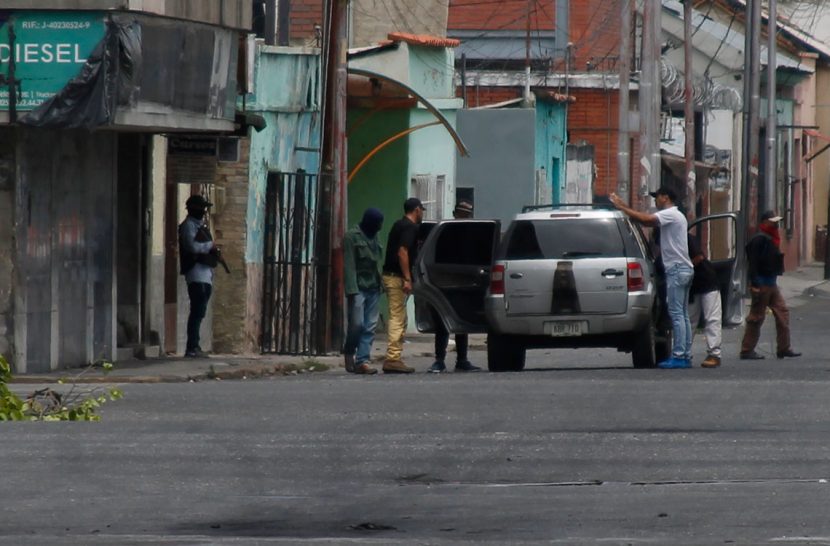In Barquisimeto, Paramilitaries Are in Charge of Repression
The so called colectivos have all the support from the military and the police to keep this city of Western Venezuela from rebelling against the regime.


Photos: Juan Brito/Edickson Durán
On March 21st, 2019, José Gustavo Montilla threatened to kill a woman and took her cell phone in Northern Barquisimeto. The victim filed the complaint and CICPC detectives arrested him. During the raid in Montilla’s house, the police found credentials connecting him with the Alí Primera 4F group, showing his picture and Venezuelan ID card number. On the back, the credential said: “Authorized to carry firearms if the country requires it.”
On April 27th, 2019, Special Actions Force (FAES) issued a memo recounting the arrest of four criminals for usurpation of functions and carrying firearms. Their documents said they were part of the Revolutionary Resistance Network. The men were disguised as FAES officers, and were captured by the real ones after an anonymous caller gave them in.
“These comrades are in jail at the moment,” says the Revolutionary Resistance Network in one of their most recent Facebook publications. “They were photographed and identified as colectivos when they were offering support in a situation where the declared opposition wanted to make this healthcare center their bastion with the issue of humanitarian aid.”
It all confirms the last step on a chain of anarchy: while it’s true that colectivos have worked in Venezuela for years with the state’s approval and support, 2019 finds these groups clashing with actual official security forces.
A 2017 investigation by NGO PROVEA, titled “Colectivos Grow Stronger with the State’s Consent,” reads that these armed groups have been acting in Barquisimeto since 2012, “shielded behind social organizations created by the government itself.” According to the NGO, between 2013 and 2017, colectivos have been increasingly organized, deployed and financed by state institutions with the clear goal of repressing public protests through extrajudicial methods.

Colectivos have been acting in Barquisimeto since 2012, shielded behind social organizations created by the government itself. Photo: Edickson Durán
Andrés Colmenárez, coordinator of Funpaz, said that the organization has been documenting the actions of these groups after the events of April 2013, with the first protests against Nicolás Maduro, demanding to recount the votes of the presidential elections.
Colmenárez says that “paramilitary colectivos took to the streets to attack protests,” mentioning the case of Rafael Suárez, who was shot and has a 9mm bullet still lodged in his pelvis.
In February 2014, new protests broke out in the streets of Barquisimeto and demonstrators were also attacked by these groups; in 2017, once again colectivos were set loose on public rallies and residential areas.
But on May 1st, 2019, also in the context of protests, Funpaz documented the actions of colectivos arrested by regional police. The men admitted in videos that went viral that they’d been trained to attack citizens by order of general Jesús Salazar Velásquez, commander of ZODI Lara.
“We’re the chavista revolutionary process,” one of the men said. “Today we went out to fight the people who stand against this process and who are screwing up our country; in a joint action led directly by our ZODI general Salazar.”
The Revolutionary Resistance Network is made up of 30 so-called political and social movements which have issued statements rejecting the “persecution and criminalization” of colectivos, trained and financed by the state itself. Official security bodies, they believe, are tacitly accepting orders from “the mutinous National Assembly,” who called for disarming and prosecuting armed irregulars.
Police sources (who wish to remain anonymous) revealed information in memos, images and videos of 13 paramilitary groups involved in criminal activities in Barquisimeto. In the most recent call for protests, on May 1st, demonstrators were robbed at gunpoint by these irregulars, who even wounded a police officer. According to witnesses, the men carried three guns and two shotguns, they wore hoods and drove by in two plateless vehicles. They were arrested and released shortly after, by orders of chavista governor Carmen Meléndez.
In this context, human rights activists keep documenting the tension of state forces among themselves, with very high stakes considering that, according to data supplied by criminal lawyer Fermín Mármol García, “there are 7,000 armed men in at least 20% of the country’s parishes.”
Caracas Chronicles is 100% reader-supported.
We’ve been able to hang on for 22 years in one of the craziest media landscapes in the world. We’ve seen different media outlets in Venezuela (and abroad) closing shop, something we’re looking to avoid at all costs. Your collaboration goes a long way in helping us weather the storm.
Donate




